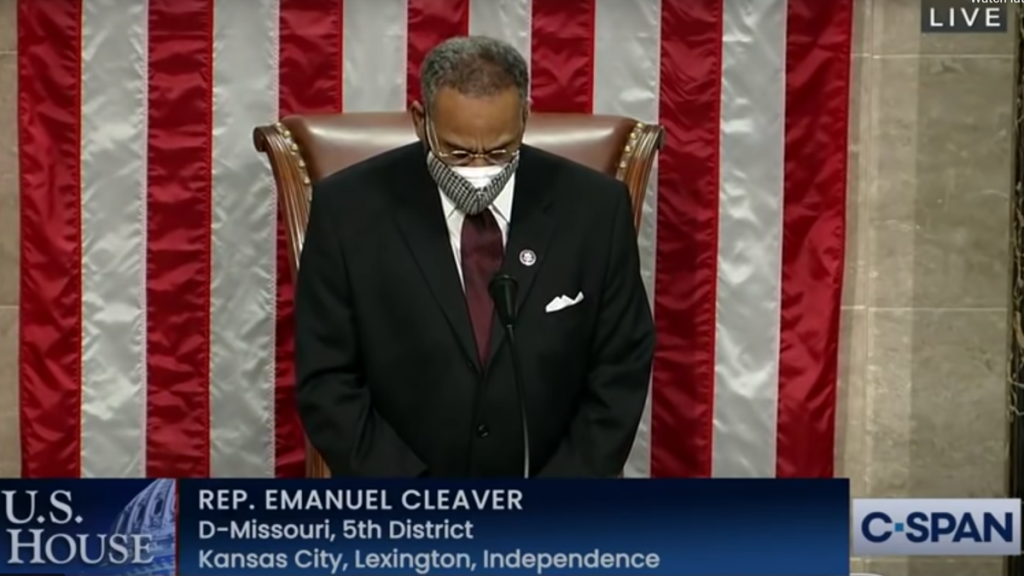[This article originally appeared in SALVO (www.salvomag.com) and is reproduced here with permission. – Ed. Image from C-SPAN.]
Democratic Congressman and former mayor of Kansas City Emanuel Cleaver, who is also an ordained Methodist minister, has taken some heat for his closing prayer on the first session of the new Congress.
At the end of the prayer, Rep. Cleaver closed with, “We ask it in the name of the monotheistic God, Brahma, and God known by many names, by many different faiths. Amen, and awomen.” “Brahma,” for any not up on their foreign deities, is the Hindu creator-god. And “awomen” is. . . well. . . kind of dumb, as many commentators have pointed out.
“Amen,” for those who have not the least bit of knowledge of Christian history or the Greek language, is a word derived from the Greek, and a word that can mean roughly “truth,” “verily,” or, as is often the case in our modern usage, “let it be done.” It has no involvement at all with “gender,” as the term is now understood. Commentators ripped Cleaver apart for his misuse of the word—Ben Shapiro at the Daily Wire called it the “stupidest” thing he’s ever heard, and Donald Trump, Jr., tweeted that the prayer was “insane.” But the Representative from Missouri has responded that he was “deeply disappointed” that his “prayer has been misinterpreted and misconstrued by some to fit a narrative that stokes resentment and greater division among portions of our population.” He meant the closing only as a “lighthearted pun in recognition of the record number of women who will be representing the American people in Congress during this term as well as in recognition of the first female Chaplain of the House of Representatives whose service commenced this week.”
The prayer has received the most attention for the use of “awomen,” but there are really three things worth pointing out here.
First, Rep. Cleaver’s invocation of “the monotheistic god, Brahma” is worthy of its own critique. Hindus represent less than one percent of religious adherents in the U.S., so Cleaver certainly wasn’t appealing to a voter base. Rather, the invocation was nothing more than a woke gesture meant to imply that all gods are equal; the name of the god you pray to doesn’t matter, because we’re all seeking truth. It is a relativistic and even pagan impulse. The fact that Rep. Cleaver (and many before him) have gone universalist in their prayers before Congress, when most Americans still profess to be at least nominally Christian, says much about the political elite’s disdain for average Americans.
Second, Cleaver’s response that his prayer was merely a “lighthearted pun” meant to honor women in Congress raises some concern over what he sees as the nature of prayer. His prayer was not solely to humbly beg God for His aid in this troubled, broken time, a time truly needing the help of the Divine, but to pat ourselves on the back for our inclusiveness.
And third, the use of “awomen” is another dangerous instance of the modern American left’s twisting of language to suit the interests of whatever ideology is in vogue at the time. It doesn’t matter that the original word means “true” or “surely,” and has been called an “expression of absolute trust and confidence.” Cleaver didn’t care that the word is really an expression of faith, an affirmation of the prayer that came before it. Rather, he made it suit his own political and ideological goal. The first step for the left has always been to change the vocabulary. Think “sexual orientation” instead of “sexual preference,” or “undocumented worker” instead of “illegal immigrant.” When words don’t have meanings, they become useful and deadly tools in the war against truth.
The prayer is reprehensible on a number of levels, and the correct and best response may very well be to simply laugh at it. But it may also serve as an important reminder of the underhanded ways that the left tries to manipulate both language and theological truths.
